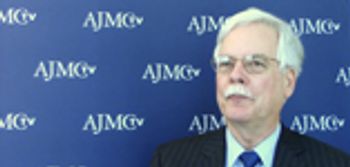
Resource constraints may confine the ability of physicians to deliver optimal cancer care to all patients across the world, which the National Comprehensive Cancer Network is acknowledging by resource stratifying its Guidelines.

Resource constraints may confine the ability of physicians to deliver optimal cancer care to all patients across the world, which the National Comprehensive Cancer Network is acknowledging by resource stratifying its Guidelines.

While the cost of introductory cancer drugs is increasing rapidly, there has not been a commensurate increase in benefit, according to Peter Bach, MD, with Memorial Sloan Kettering Cancer Center.

The roundtable discussion on the second day of the National Comprehensive Cancer Network 20th Annual Conference spent a long time defining value in cancer care and how it can be incorporated into healthcare decision making.

Patients are looking for more transparency when it comes to their treatment options so they can make informed decisions and "take control of their journey," Kim Thiboldeaux, chief executive officer of the Cancer Support Community, said at the National Comprehensive Cancer Network 20th Annual Conference.

When the first National Comprehensive Cancer Network Guidelines were developed 20 years ago, even the participating members who were there at the beginning were skeptical they would be able to come to an agreement and build something lasting.

The National Comprehensive Cancer Network (NCCN) Guidelines may be successful historically, but the network isn't resting on its laurels, Robert Carlson, MD, chief executive officer, said at the NCCN 20th Annual Meeting.

During his keynote speech at the National Comprehensive Cancer Network (NCCN)'s 20th Annual Conference, Chief Executive Officer Robert Carlson, MD, spent the majority of his time discussing the NCCN Guidelines because they are the core of its services.

Monday's oral abstract sessions on multiple myeloma at the Annual Meeting of the American Society of Hematology featured final phase 1b/2 results on the elotuzumab combination that received breakthrough therapy status from FDA earlier this year.

Pomalidomide was approved by FDA in February 2013 for multiple myeloma patients whose disease has progressed despite having received at least 2 other therapies. On Monday, researchers at the American Society of Hematology Annual Meeting presented results of phase 2 studies on combinations with the immunomodulatory drug.

On the second day of the 56th Annual Meeting of the American Society of Hematology, held December 6-9 in San Francisco, a session on tyrosine kinase inhibitors in treating chronic myelogenous leukemia included 5-year follow-up results from the DASISION trial and recognizing failure for major molecular response to guide treatment modification.

At an education session at the American Society of Hematology Annual Meeting, Christopher R. Flowers, MD, MS, discussed current thinking in the use of routine imaging for patients who have achieved a long-term complete response in non-Hodgkin lymphoma.

The plenary session on the second day of the 56th Annual Meeting of the American Society of Hematology, held December 6-9 in San Francisco, saw the best presentations, selected by the Program Committee, from among the thousands of scientific abstracts that were accepted for the meeting. These talks included a JAK/STAT-mediated thrombopoietin regulation by the Ashwell-Morell receptor, lenalidomide-mediated casein kinase regulation in myelodysplastic syndrome, and the results of the SORAML trial in acute myeloid leukemia.

A novel treatment method unveiled at the 56th Annual Meeting of the American Society of Hematology was among 4 important studies about reducing blood clots presented Sunday at the gathering in San Francisco.

Saturday's poster session on Health Services and Outcomes research featured results projecting an overall reduction in medical costs from the use of new oral anticoagulants, and new studies about the treatment of children with sickle cell disease.

Jesus F. San Miguel, MD, PhD, of the Spanish Myeloma Group, delivered the Han-Wasserman Lecture and discussed prognostic factors that allowed his research team to give early treatment to high-risk patients, improving their survival.

While medical oncologists, drug developers, and research scientists presented their research findings and novel treatment options in hematological cancers, a special session in the afternoon on the first day of the 56th Annual Meeting of the American Society of Hematology (ASH), held December 6 to 9 in San Francisco, addressed the aspect of cost of care and the increasing financial burden faced by the cancer patient.

Final safety and efficacy results for vismodegib were reported at the Society for Melanoma Research, 2014 International Congress, for the 30-month mark of the ERIVANCE trial. The Congress is meeting November 13-16 in Zurich, Switzerland.

Despite the various treatment advances in melanoma, advanced stages of the disease remain a significant challenge for oncologists. Novel methods of attacking disease vulnerabilities continue to be developed-one such technique is the use of oncolytic viruses to destroy cancer cells. A couple of studies presented an update on preclinical and clinical progress with CAVATAK, formulated using the common cold Coxsackievirus Type A21 (CVA21), during the Society for Melanoma Research, 2014 International Congress in Zurich, Switzerland, November 13—16.

Patients with metastatic melanoma receiving vemurafenib following disease progression showed similar or better overall response to patients without progressive disease, according to findings from an analysis reported at the 11th International Congress of the Society for Melanoma Research on November 15, 2014.

Results of a head-to-head comparison of pembrolizumab and standard chemotherapy in patients with advanced melanoma, including those who had experienced disease progression following ipilimumab, showed superior clinical response with pembrolizumab that was durable.

Much of the news at the Society of Melanoma Research, 2014 International Congress, involves breakthrough therapies for treating metastatic melanoma in its later stages. But the year has brought developments in diagnostics, too. Tools to determine which patients need aggressive treatment and which ones do not are becoming important. As awareness of melanoma grows, more patients arrive at doctors' offices with suspicious skin marks at earlier stages.

Nivolumab continues to show an impressive response that is both prompt and durable in patients with advanced melanoma, according to updated results from a long-term follow-up presented at the 11th International Congress of the Society for Melanoma Research on November 15, 2014.

During the first plenary session on the second day of the Society for Melanoma Research, 2014 International Congress in Zurich, Switzerland, November 13-16, Targeted Therapies: Genetics and Biology, several researchers presented their thoughts on where they see the future of melanoma research.

As the immuno-oncology landscape intensifies, a second player in the game, Merck's PD-1 inhibitor pembrolizumab (Keytruda), was recently approved for the treatment of advanced, unresectable melanoma.

A late afternoon talk on the third day at The Liver Meeting 2014, evaluated the influence of some of the newer antiviral agents on "brain fog," a phenomenon quite commonly observed in hepatitis C virus-infected patients, especially among those with mild disease.

The efficacy of oral antivirals for hepatitis C infection is a moot point. The prevailing discussion now delves into the best combinations that can target different viral genotypes, access to these combination regimens, and the subsequent dent in the budget of the patient, the health plan, or the care provider-as the case may be.

Medicare costs, Department of Veterans Affairs budgetary costs, and the economic impact on the developing world-these were some of the topics discussed at the evening session, Health Economics and Cost-Effectiveness, on the third day at The Liver Meeting 2014, held in Boston, Massachusetts, November 7 to 11, 2014.

Amidst discussions on liver care, transplants, and infections was a session on Value-Based Medicine in Hepatology, on the third day at The Liver Meeting 2014, an annual event by the American Association for the Study of Liver Disease, held in Boston, Massachusetts, from November 7 to 11, 2014. Presenters saw a huge turnout for the session, a sign of increased interest in value-based care.

A pattern is emerging in the hepatitis C virus treatment realm-of the newly approved agents, the sofosbuvir- and simeprevir-based regimens are gaining traction. A poster session on approved therapeutic agents on November 9, 2014, at the annual meeting of the American Association for the Study of Liver Disease, proved this again.

Bashar A. Aqel, MD, Mayo Clinic, Phoenix, Arizona, presented results from phase 2 of the COSMOS (Combination Of SiMeprevir and sOfosbuvir in hepatitis C virus genotype 1 infected patients) trial.

259 Prospect Plains Rd, Bldg H
Cranbury, NJ 08512
© 2025 MJH Life Sciences®
All rights reserved.
